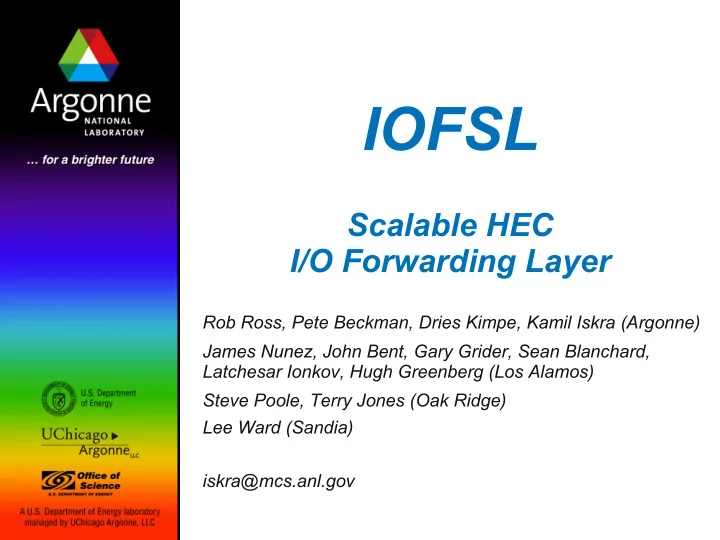

IOFSL Scalable HEC I/O Forwarding Layer Rob Ross, Pete Beckman, Dries Kimpe, Kamil Iskra (Argonne) James Nunez, John Bent, Gary Grider, Sean Blanchard, Latchesar Ionkov, Hugh Greenberg (Los Alamos) Steve Poole, Terry Jones (Oak Ridge) Lee Ward (Sandia) iskra@mcs.anl.gov
Contents Motivation Mission I/O Forwarding Framework ZOIDFS Protocol BMI ZOIDFS Server POSIX Support Current Status 2
Motivation Research into I/O infrastructure for petascale architectures: Today: 100K nodes (LLNL BG/L), 300K cores (Juelich BG/P) – will filesystems be able to handle an order of magnitude more? Argonne's 557 TF Blue Gene/P (Intrepid): – 20% of the money spent on I/O – full memory dump takes over 30 minutes I/O quickly becoming the bottleneck 3
Hardware Overview 4
Software Overview We need to make I/O software as efficient as possible 5
Mission Design, build, and distribute a scalable, unified high-end computing I/O forwarding software layer that would be adopted and supported by DOE Office of Science and NNSA. Reduce the number of file system operations/clients that the parallel file system sees Provide function shipping at the file system interface level Offload file system functions from simple or full OS client processes to a variety of targets Support multiple parallel file system solutions and networks Integrate with MPI-IO and any hardware features designed to support efficient parallel I/O 6
I/O Forwarding Framework Client Processing Node ROMIO libsysio FUSE ZOIDFS Client Network API System Network I/O Forwarding Server Network API ZOIDFS Server PVFS POSIX Lustre PanFS 7
ZOIDFS Protocol Stateless NFSv3-like protocol opaque, 32-byte zoidfs_handle_t (no file descriptors) zoidfs_lookup , zoidfs_create (no open, close) zoidfs_getattr retrieves only the requested attributes zoidfs_readdir can do getattr if requested Maximally flexible zoidfs_read , zoidfs_write : int zoidfs_read(const zoidfs_handle_t *handle, size_t mem_count, void *mem_starts[], const size_t mem_sizes[], size_t file_count, const uint64_t file_starts[], uint64_t file_sizes[]); 8
BMI Buffered Message Interface Designed for PVFS2 Asynchronous Thread-safe Support for multiple networks: – TCP – IB – GM, MX – Portals – (need to write one for Blue Gene) XDR-encoded metadata between clients and servers – data payload sent using expected messages 9
ZOIDFS Server Two server designs (basic and advanced) Multi-threaded or state machine “native” PVFS and POSIX drivers Will also use libsysio as file system abstraction layer Planning to leverage a cooperative caching layer from a related NSF project Planning to use pipelining for large requests – instead of fragmenting of requests on the client side – requires careful buffer management 10
POSIX Support Client-side: – FUSE (works, but performance not explored) – SYSIO (still to be implemented) Server-side: – SYSIO (still to be integrated) has a “native” POSIX driver – Custom ZOIDFS POSIX driver – How to translate between file handles and file descriptors? • File handles are stateless, persistent, and global • Globally accessible database? • ESTALE for unknown handles forces a re-lookup 11
Security NNSA labs care... Concerns: – authentication – authorization I/O forwarding servers might need to forward data of multiple users Add credentials to requests We will use POSIX test suite from The Open Group, which includes a security module 12
Early Measurements IOFSL/PVFS Direct PVFS On this platform, IOFSL just introduces overhead 13
Current Status Client: – FUSE client implemented – Basic ROMIO driver implemented Networking: – BMI extracted from PVFS – ZOIDFS over BMI implemented Server: – Several server designs explored – libsysio file handle and credentials interfaces implemented – ZOIDFS to PVFS and POSIX drivers implemented 14
Future Integrate libsysio on both client and server Pipelining Test on Cray XT Support for Blue Gene Cooperative caching between servers Security http://www.iofsl.org/ (mostly a placeholder for now) 15
(if you see this slide, then I must have pressed End instead of PgDn) 16
Recommend
More recommend